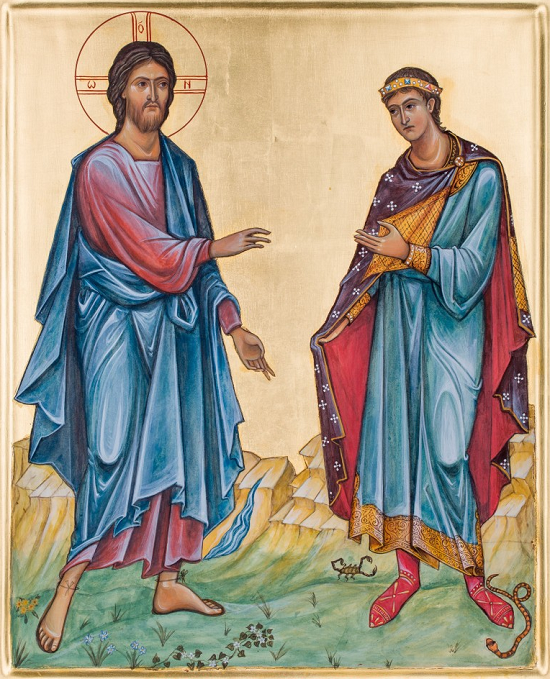Scripture Readings

Today’s gospel passage from Saint Luke contains some guidance for those who would be followers of Jesus. Before we get to that, I’d like to help you discover an underlying theme that might not be evident, even after hearing today’s first reading from the First Book of Kings. Today’s gospel passage is full of the prophet Elijah.
The first instance begins with the first sentence. “When the days for Jesus’s being taken up were fulfilled…” This phrase creates a direct parallel between Jesus’s suffering, death, resurrection and ascension in Jerusalem and Elijah’s being taken up to heaven in a chariot of fire. Jesus is taken up as Elijah was taken up. Jesus journeys to Jerusalem where he will be taken up as Elijah journeyed to the Jordan where he was taken up.
The second reference to Elijah comes just a bit later in the passage, when the Samaritan village would not welcome Jesus and his messengers. They refused to welcome them, not because they weren’t open to their message, but because they were traveling to Jerusalem, and the Samaritans did not accept that God should be worshiped in the temple there. But, in response, James and John—who were known as the sons of thunder—wanted to call fire down from the sky to consume them as Elijah called fire down upon the prophets of Ba’al and consumed them [1 Kings 19:19-21]. Jesus rebuked his disciples. His message was not one of vengeance, even upon those who rejected him.
The third time the gospel refers to Elijah occurs when it describes the two men whom Jesus called to follow him as Elijah called Elisha to follow him. As we heard in our first reading, when Elisha was summoned, he asked leave to follow the precepts of the Law of Moses and provide for his father and mother. Elijah gave him leave. However, in the gospel passage, once again, Jesus eclipses Elijah and gives his disciples a deeper challenge. When the first man asks for leave to bury his father—one of the most sacred obligations of the Law—Jesus answers him sternly. However, we mustn’t take Jesus’s answer too literally. Nowhere does it say that Jesus refused the man leave to go. His response is merely a reminder that the call to follow Jesus is a call to life, and that life takes precedence over every earthly obligation. He tells his disciples, in effect, let the spiritually dead spend themselves in dead works; you strive for life.
Nor is the second man refused discipleship. Jesus takes that opportunity—referring directly to Elijah and Eisha without naming them—to teach the futility of second-guessing one’s commitment to the spiritual life, just because it may prove to be tedious or hard. Fitness for the Kingdom of God does not mean that God rejects those who are unfit, for no one starts out “unfit” for the spiritual life. It simply means that living a truly spiritual life can be hard, and only the spiritually fit can make it to the end without faltering.
Think about your own experience with prayer and meditation. It’s easy when we’re highly motivated by goals we need to reach or challenges we need to overcome. Then, we’re drawn to seek God’s presence and God’s help. But we’re human. With time and success, motivation slips away. We begin to think, “God won’t mind if I skip today,” or “I can’t concentrate—I try to pray and meditate, but I get distracted—it’s useless.” Only the spiritually fit—only those with the courage to persevere even through the good times when we lack motivation—only they will experience spiritual growth. In every case, when dealing with the spiritual life, to fail to grow is to die. It’s akin to pedaling a bicycle uphill: if you stop pedaling, you don’t stand still, you roll backwards.
So, in the light of today’s gospel, what does it mean to be a follower of Jesus? What price was the man willing to pay who proclaimed his willingness to follow Jesus “wherever [he] goes.” It means perseverance. It means giving up our expectations for a quid pro quo. As followers of Jesus, we can never say, “Look, God, what I’ve given up for you,” or “Look, God, at all I’ve done for you” with the expectation that God will pay us back in kind. The so-called “prosperity gospel” is rubbish. Our reward is in the doing. We eat and sleep to maintain our physical lives and to function in this world. We do as Jesus did, we pray as Jesus prayed, we love as Jesus loved because that maintains a spiritual life within us that transcends the limits of our physical existence. Following Jesus is food for our spirits. Only the physically, mentally, and emotionally fit can make any kind of a living in this world. Only the spiritually fit can build a life that will not end.
Elisha was prepared to follow Elijah wherever he went to receive a double portion of his spirit. But we have a greater than Elijah here and we already have the gift of the Holy Spirit. Luke reminds us that we need to work to maintain it despite deprivation, despite loss, despite our other obligations, and, especially, despite the apathy that comes with success.
Get articles from H. Les Brown delivered to your email inbox.
